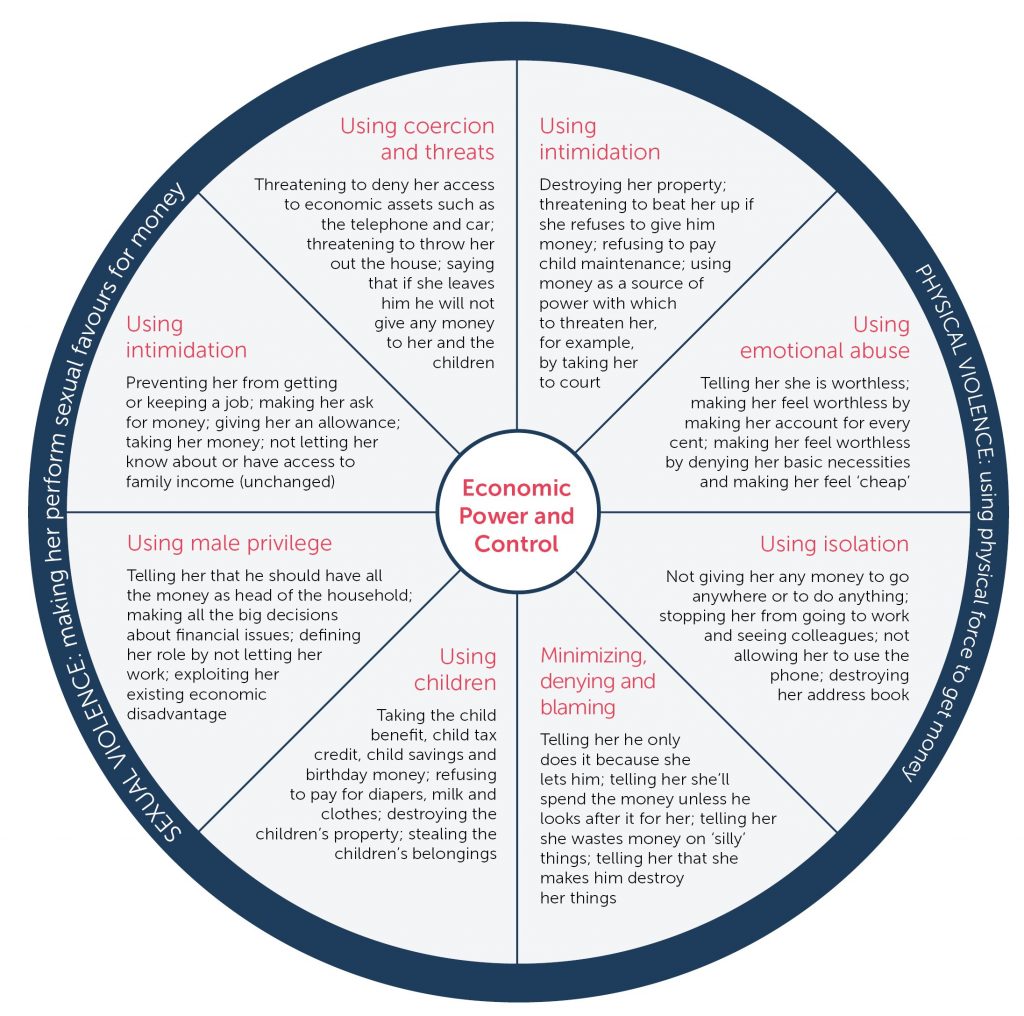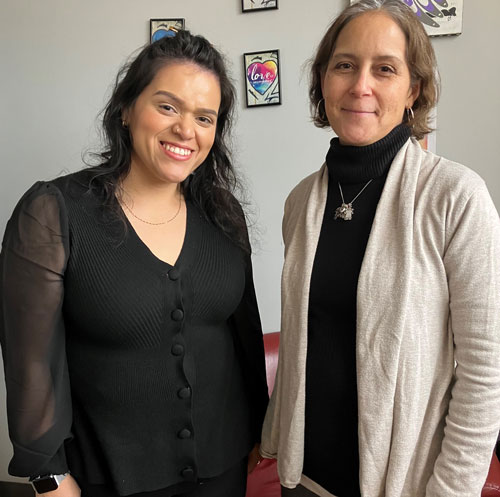BWSS Briefing Note: Economic Abuse Awareness Day
The Province of British Columbia has proclaimed Saturday, November 26th, 2022, as Domestic Economic Abuse Awareness Day.
BWSS is pleased to hear that the BC government is observing Domestic Economic Abuse Awareness Day and we are hopeful that this announcement will bring more attention and visibility to the issue of economic and financial abuse against survivors of intimate partner violence.
We see BC’s adoption of November 26th as Domestic Economic Abuse Awareness Day as an opportunity to educate the public about the realities and dangers of economic abuse and intimate partner violence more broadly, to encourage policy change in favour of survivors of economic abuse, and to improve service delivery for survivors of economic and other forms of abuse.
BC’s decision to dedicate November 26th as Domestic Economic Abuse Awareness Day follows the lead of the Canadian Centre for Women’s Empowerment, a national organization dedicated to “addressing Economic Abuse and injustice through advocacy, education, research, economic empowerment and policy change”, which observes November 26th as a day to educate about and prevent economic and financial abuse as part of 16 days of activism against gender-based violence. The Province of BC also follows the lead of 27 Canadian cities who have formally recognized November 26th as Economic Abuse Awareness Day, including the BC communities of Comox, Courtenay, Cumberland, Squamish, Surrey, Vancouver, and Victoria.
What is Economic Abuse?
Economic abuse is a form of coercive control that abusers often use in intimate relationships to prevent their partner from developing and maintaining financial independence.
Economic abuse involves efforts to sabotage women’s livelihoods in an attempt to deny them their agency and autonomy, and especially to deny them of their ability to flee violent and abusive relationships.
Angela Marie MacDougall, Executive Director of BWSS writes that “Economic abuse is defined as controlling a woman’s ability to acquire, use, and maintain economic resources. Economic abuse is as common in abusive relationships as physical, sexual, and emotional abuse”.
Economic abuse is often reinforced by the threat and use of physical and sexual violence.
Economic abuse takes many different forms and is carried out with a variety of different strategies.

Image credit: Canadian Centre for Women’s Empowerment. Adapted from Domestic Abuse Intervention Programs (DAIP), the Duluth Model, Duluth, Minnesota.
The Western Centre for Research and Education on Violence against Women and Children identifies three distinct forms of economic abuse and associated tactics used to intimidate and ultimately control women: economic control, economic exploitation and economic sabotage, and associated tactics used to intimidate and ultimately control women: economic control, economic exploitation and economic sabotage.
Economic control, they state, “restricts access to or decision-making over resources”, while economic exploitation “involves destroying the individual’s financial resources or credit”. Economic sabotage “inhibits the individual’s ability to gain or maintain work”.
Ultimately, economic or financial abuse is used to secure total financial control over women as a means of preventing them from fleeing to safety.
Abusers may prevent their partner from earning their own income through employment or may take their partner’s earnings from them in order to have control over their finances. An abusive partner might discourage and interfere with women’s attempts to pursue educational opportunities, making it difficult to pursue their employment and career goals over time. Abusers may destroy a woman’s home, vehicle, or possessions, forcing her to constantly pay costs for renovations and repairs, as well as replacing important items like cell phones and laptops. Abusers may take control of family finances, steal money from their partners, and withhold vital necessities in the hopes that women are left dependent and disempowered.
After a woman leaves a violent relationship, survivors may be subject to post-separation abuse that can include economic and financial abuse. Abusers may withhold child support payments to “punish” women for leaving and moving on with their lives. They may use the court systems to continue to exploit and harass women by involving them in lengthy, emotionally, and financially draining court battles.
Prevalence of Economic Abuse
As an anti-violence organization with decades of experience providing support to survivors of intimate partner violence, BWSS knows that economic and financial abuse is a widespread tactic that abusers use in an attempt to exercise control over their partner.
The vast majority of women who experience intimate partner violence experience economic or financial abuse as well. According to data from the Canadian Centre for Women’s Empowerment, economic abuse is “experienced by more than 95% of domestic violence victims” and “is experienced by women from all backgrounds, regions, and income levels. Women from marginalized groups, including Black, racialized, and Indigenous women (BIPOC), are at a higher risk of Economic Abuse”.
While we can attest to the prevalence of economic abuse on survivors, we recognize that it can be difficult to identify and even more difficult to address. In a discussion with BeCause Radio, Meseret Haileyesus, Founder and CEO of the Canadian Centre for Women’s Empowerment, stated that economic abuse is an “underreported, poorly recognized, and seldomly discussed form of abuse”. Economic abuse is often overlooked by service providers, whose lack of knowledge and awareness of economic and financial abuse poses a significant barrier for survivors.
A new report, Understanding the Nature of Economic Abuse: A National Study on Service Provider Insights in Canada, commissioned by the Canadian Centre for Women’s Empowerment and funded by Women and Gender Equality Canada, notes that “systemic barriers exist in the Canadian legal, financial and social services system[s]” that “compound the impact of Financial Abuse”. The report highlights how financial institutions, and a variety of social services such as legal, criminal justice and mental health services, are undertrained and lack the resources to identify and properly respond to financial abuse. Financial institutions, for example, “do not have policies for financial abuse in the IPV context” and were rated by survivors of economic abuse as “least helpful amongst a number of other service providers such as shelters and hospitals”.
BWSS supports calls for the delivery of intensive training for professionals working within fields where economic and financial abuse may take place, including financial institutions, and social services such as legal, criminal justice and mental health services, to become better able to recognize and act upon signs of economic and financial abuse.
In our resource titled “What is Economic Abuse”, BWSS notes that in addition to the normalization of a power hierarchy and male domination, women’s economic dependence is normalized, internalized, and reinforced by society. Women have reported that their economic dependency is also reinforced by societal and systemic gender discrimination that limits or denies women the opportunities to access and participate in the labour market and earn equal wages as male counterparts.
The gender wage gap is well documented in Canada; Statistics Canada reported in 2019 that women earn 76.8 cents for every dollar earned by men nationwide. Women who experience economic or financial abuse face not only precarious employment and education as a result, but also the barriers posed by society more broadly.
Economic Abuse and the Housing Crisis
At BWSS, we know that access to safe, affordable housing is one of the most important factors for women and gender-diverse people who are escaping intimate partner violence.
Economic and financial abuse, a woman’s ability to flee a violent relationship, and the ongoing housing crisis both in BC and nationwide are all interrelated and overlapping. Economic abuse often affects a woman’s income and level of debt, which together impact her ability to find housing when she is fleeing violence.
With many landlords now checking the credit scores of potential tenants, women with poor credit scores as a result of economic or financial abuse may not find themselves in a competitive position during their search for housing. For women who struggled to pay rent on time during the abusive relationships they experienced, securing references from former landlords may further complicate their search for stable and secure housing.
BWSS sees the development and prioritization of affordable housing, the normalization of a living wage, and the establishment of universal basic income, as crucial solutions to the impact of economic and financial abuse on the lives of women and gender-diverse people fleeing intimate partner violence. In particular, we know that solutions that make it possible for women to secure safe and sustainable housing will address many of the implications of economic and financial abuse that a woman may face.
How BWSS is taking action to combat economic abuse
Throughout 40 years of our work at Battered Women’s Support Services, we have learned that women with economic skills and supports are more likely to leave abusive relationships and sustain themselves and their families into the future.
BWSS helps women to work towards restoring their economic and financial independence through its Advancing Women’s Awareness Regarding Employment (AWARE) program.
AWARE seeks to provide employment and economic development for women and femme survivors of violence and abuse. This program recognizes and addresses the unique barriers that survivors face and supports them to move towards economic independence and self-reliance.
Through the AWARE Program, BWSS serves and supports an average of 180 to 200 women per year to achieve their training, career, and employment goals. The AWARE program empowers survivors to be financially or economically independent by providing weekly and monthly workshops and ongoing support with one-on-one appointments.

We know that women require specific resources that can provide them with the knowledge and skills they need for economic empowerment.
BWSS AWARE program team members Claudia Maldonado and Jennifer Ramirez work with survivors to address barriers to economic independence, including career assessment and exploration, assistance with researching and applying for educational opportunities, childcare, providing and connecting women with emotional supports, preparing women to enter the workforce, and ensuring women feel supported in their work environment.
By working with survivors where they’re at, AWARE program team members walk alongside survivors, supporting them with what they need to become financially and economically independent.
AWARE Participant Feedback
Below are testimonials from former AWARE program participants.
“The program has been so hopeful, I feel motivated to keep going in my search for a better job.”
“What AWARE means to me. A safe place to come and have ladies run different groups for us. Unemployment, trauma groups or 16 Steps, Counselling and a place to meet others that are in the same situation as us. I want to thank all of them, they do so much and very appreciated. Thank you.”




